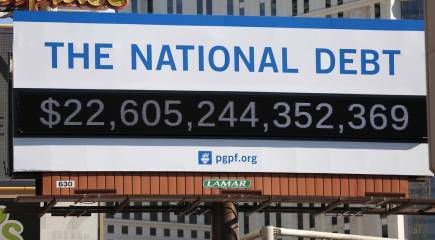EDITORIAL: The myth of President Joe Biden the deficit slayer
President Joe Biden is grasping at as many thin reeds as he can in his effort to spin Americans that his administration isn’t economically incompetent. It’s an uphill battle during a time of soaring inflation and negative growth.
The White House typically highlights reasonable job creation and unemployment numbers as proof of Mr. Biden’s fine stewardship. But with the Fed now finally raising interest rates while trying to tamp down rising prices, it’s unclear how much longer employment figures will cooperate.
As a result, the president has moved on to touting his supposed commitment to deficit reduction. This month, he scolded reporters for not promoting the “fact” that the deficit “has gone down both years that I’ve been here. Period.” It didn’t take long for the Congressional Budget Office to put to rest the myth of Mr. Biden as deficit slayer.
Last week, the CBO released new revenue projections for the next decade, concluding that the current administration has put in motion spending policies that will lead to an annual budget hole of $2.3 trillion by fiscal 2032.
“Since July 2021, CBO has raised its projection of the 10-year deficit by a total of $2.4 trillion, mainly because of newly enacted legislation,” the agency report explains. “Revenue increases, which reduce deficits, were mostly offset by economic changes that increased outlays — particularly those for interest and Social Security.”
In other words, it’s the spending, stupid.
Washington is in the midst of a revenue boon, with both corporate and individual tax receipts rolling into the Treasury at unprecedented rates. So far in the current fiscal year, the government has collected a record $3 trillion.
But the congressional penchant for mainlining other people’s money ensures that the windfall goes right back out the door. The 2022 omnibus budget bill that the president signed hiked spending by more than $600 billion, Eric Boehm of Reason magazine notes. In the meantime, inflation has made borrowing more expensive, meaning “the federal government spent 32 percent more on servicing its debt in April compared with a year earlier,” The Wall Street Journal reported this month. That’s largely because of inflation-protected Treasury bills.
It’s true that the deficit has fallen during Mr. Biden’s two years in office, but that is simply a reflection of the baseline. Federal spending soared during the pandemic, as Congress doled out trillions in relief without regard to budgetary niceties. As the country returns to normal footing, the deficit has inevitably declined.
But even after two years of deficit reduction under Mr. Biden, the budget gap remains historically high. And as the CBO projects, its trajectory in coming years — thanks to this president — is the opposite of down.






















